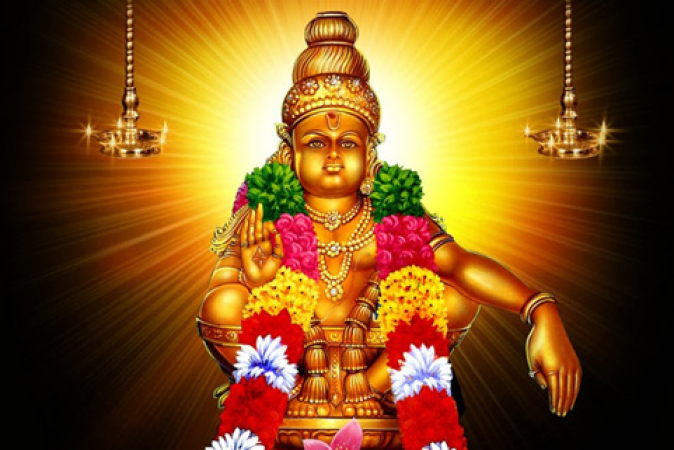
Lord Ayyappa, also known as Hariharan Puthiran or Manikandan, is a revered deity in Hinduism. He is considered the son of Lord Shiva and the feminine incarnation of Lord Vishnu's Mohini. Lord Ayyappa is primarily worshiped in the states of Kerala, Tamil Nadu, and Karnataka in South India. This article delves into the fascinating history of Lord Ayyappa, explores the rituals and practices associated with his worship, and outlines the rules that devotees traditionally follow.
The History of Lord Ayyappa:
The origin of Lord Ayyappa traces back to the legend of the union between Lord Shiva and Mohini, the enchanting female form assumed by Lord Vishnu. The story goes that Lord Ayyappa was born to foster parents, King Rajashekara Pandyan of Pandalam and Queen Dharmaprabha. His birth was a result of Lord Shiva's union with Mohini during the churning of the celestial ocean, known as the Samudra Manthan. As he grew up, Lord Ayyappa displayed divine powers and performed numerous miracles, endearing himself to the people.
Lord Ayyappa's Journey to Sabarimala:
According to popular belief, Lord Ayyappa embarked on a spiritual journey to Sabarimala, a prominent pilgrimage site located in the Western Ghats of Kerala. It is believed that he meditated in the form of a yogi in the forests surrounding the Sabarimala temple. Devotees undertake a challenging pilgrimage known as the Sabarimala Yatra to pay homage to Lord Ayyappa. The journey involves a rigorous 41-day austerity period and culminates in a trek through dense forests to reach the temple.
Worshiping Lord Ayyappa:
Devotees of Lord Ayyappa adhere to a set of rituals and practices during their worship. Here are some key aspects of worshiping Lord Ayyappa:
Observing the Mandala Vratham: The Mandala Vratham is a 41-day austerity period undertaken by devotees before the Sabarimala Yatra. During this time, devotees follow strict rules, including maintaining celibacy, practicing abstinence from alcohol and non-vegetarian food, and engaging in daily prayers and meditation.
Visiting the Sabarimala Temple: Devotees visit the Sabarimala temple during the Makaravilakku season, which usually falls in the months of December and January. The pilgrimage involves climbing the Neelimala and Appachimedu hills, observing a fast, and wearing traditional black attire. The sacred "Irumudi" (a two-compartment bag) containing offerings is carried on the head throughout the journey.
Offering Prayers and Vows: Devotees offer prayers at the temple and take vows, seeking Lord Ayyappa's blessings for specific wishes or in gratitude for fulfilled desires. The vows often involve observance of specific rituals, such as fasting, performing acts of charity, and abstaining from worldly pleasures.
Engaging in Bhajans and Bhakti: Bhajans (devotional songs) and bhakti (devotion) play an essential role in worshiping Lord Ayyappa. Devotees gather in groups to sing bhajans, expressing their love and reverence for the deity. It creates an atmosphere of spiritual bliss and fosters a sense of community among the devotees.
Rules and Guidelines for Devotees:
Devotees who worship Lord Ayyappa follow certain rules and guidelines to maintain purity and discipline throughout their spiritual journey. Here are some common rules observed:
Observing Celibacy: Devotees, particularly men between the ages of 12 and 70, are expected to observe celibacy during the Mandala Vratham and the Sabarimala pilgrimage. This practice is believed to help channel their energies toward spiritual growth and devotion.
Abstinence from Alcohol and Non-vegetarian Food: Devotees abstain from consuming alcohol and non-vegetarian food during the 41-day austerity period. This act of self-restraint is seen as a means of purifying the body and mind.
Wearing Traditional Attire: Devotees wear traditional attire, typically consisting of black or saffron-colored clothes, during the Sabarimala pilgrimage. This practice signifies unity and equality among the devotees, regardless of their social or economic background.
Observing Fasting: Fasting is an integral part of worshiping Lord Ayyappa. Devotees undertake strict fasting during the Mandala Vratham and the Sabarimala Yatra. Some devotees choose to fast on specific days of the week or during auspicious occasions dedicated to Lord Ayyappa.
Lord Ayyappa holds a special place in the hearts of millions of devotees, who embark on arduous pilgrimages and observe strict rituals to seek his blessings. The history of Lord Ayyappa, his journey to Sabarimala, and the practices associated with his worship are deeply ingrained in the cultural and religious fabric of South India. By adhering to the prescribed rules and guidelines, devotees aim to cultivate discipline, purity, and devotion in their lives. The worship of Lord Ayyappa continues to inspire and uplift countless individuals, fostering a profound sense of spirituality and unity among his followers.
The Impact of Article 370 on Dalits: Examining Challenges and Concerns
You must know these things before undertaking the Amarnath Yatra in the month of Sawan
Swami Vivekananda: The world is the gymnasium of character formation